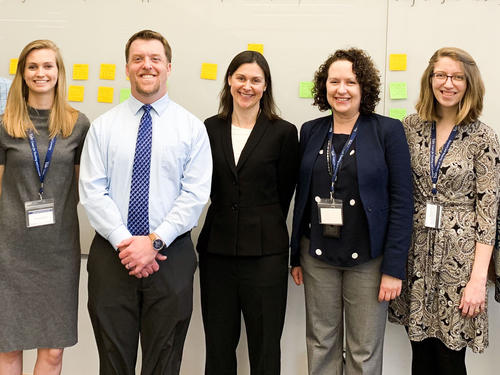
“I’m a woman, I’m a mother, and I’m a scientist,” said Valerie Horsley, Associate Professor of Molecular, Cellular, and Developmental Biology and of Dermatology at Yale University. “I take every experience as an experiment.”
According to Horsley, approaching her pedagogy as if it were an experiment allows her to build opportunities for testing new strategies and to improve her courses over time. “If [a strategy] doesn’t fail, it might lead to really instrumental learning,” said Horsley.
Horsley joined Heather Klemann, Nancy Niemi, and Brett Smith for a panel discussion during the Annual Spring Teaching Forum held on Monday, April 29 at the Poorvu Center for Teaching and Learning. The Forum, “Productive Failure: How an Error-Positive Climate Promotes Student Success,” focused on helping graduate students, postdocs, and faculty identify strategies they can use in the classroom to introduce failure and help students achieve deep learning. Joshua Eyler, Executive Director of Rice University’s Center for Teaching Excellence and author of How Humans Learn: The Science and Stories behind Effective College Teaching (Teaching and Learning in Higher Education), delivered the keynote lecture.
The forum’s topic, traditionally chosen by a group of McDougal Graduate Teaching Fellows to reflect a discussion taking place on-campus, built on faculty and graduate student teaching fellows’ concern about the culture of success and the emphasis on an “A positive” campus at Yale.
“In order to learn well, you need to fail. Students need to confront the gaps in their learning,” said Suzanne Young, Director of Graduate and Postdoctoral Teaching Development at the Poorvu Center, during her opening remarks. “Trying and failing is a part of the path to learning.”
After Young’s remarks, Gina Hurley, Assistant Director of Graduate and Postdoctoral Teaching Development, introduced the Forum’s panelists and Hannah Lant, a McDougal Graduate Teaching Fellow and doctorate student in Chemistry, to moderate the discussion.
“Part of the student identity is tied to their performance,” said Brett Smith, a teaching postdoctoral fellow in the Mathematics Department and a former Project NExT fellow for the Mathematics Association of America. “Within Mathematics, there is a right and wrong mentality.”
Smith discussed how he introduces “explorations” in his calculus course to help students identify concepts that they do not understand. He then takes their questions and focuses on the knowledge gaps during class. He asks students to work with the material in low-stakes, fail safe environments, such as think-pair-share partners, anonymous digital polling, and small group discussions.
“Everybody thinks they need to succeed on day one,” said Niemi, Director of Faculty Teaching Initiatives at the Poorvu Center and author of Degrees of Difference: Men, Women, and the Value of Higher Education. “We can use evidence of our own failure as teaching material.”
Niemi suggested that faculty can introduce slow thought, formative assessments, and group work to help students learn without fear of failing or demonstrating a lack of understanding. According to Niemi, sharing your own failures helps build a community in the classroom, which is needed to create an environment where students feel comfortable taking risks.
“Once something is learned, it cannot be unlearned,” said Heather Klemann, Director of Expository Writing and Lecturer in English.
Klemann discussed her use of the Threshold Concept to help guide students through her courses and help them reflect on their learning. She also discussed her strategy of providing constructive feedback on students’ reflective writing instead of providing praise during class.
“We can learn more when we get something wrong and then learn why we got it wrong,” said Eyler, during his keynote. “The research shows that students fear failure even if they have not experienced much failure.”
He asked attendees to reflect on a recent article by Melina Delkic: “How ‘Makers’ Make the Classroom More Inclusive.” The introduction to the article states, “Even at 4 or 5 years old, there was already a ‘be perfect, don’t fail’ attitude” in a kindergarten class in Santa Monica, California.
The discussion focused on why children might think they are not good at something at such a young age and what factors lead to those feelings. Eyler encouraged people to remove the stigma of failure, but cautioned that today was not about failing a course – it was about failing to understand a concept, a problem set, a pre-class quiz, or a low-stakes activity. In those moments, a student has an opportunity to learn what they did wrong and how they can do it differently next time.
“Humans make mistakes, but we are designed to. And we are designed to learn from it,” said Eyler.
After the keynote, participants enjoyed structured lunch conversations lead by McDougal Graduate Teaching Fellows. Young shared a list of additional resources on the topic of productive failure. The Poorvu Center website has additional resources for faculty, postdocs, and graduate students on a variety of teaching topics.
